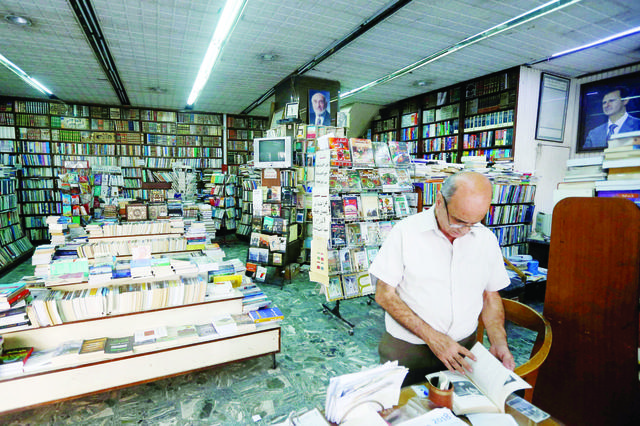Renowned libraries and publishing houses struggle to keep their doors open in Damascus
A Decrease font size.A Reset font size.A Increase font size.
Damascus - In Damascus, which has always been a meeting place for intellectuals, reputable publishing houses are struggling to keep their doors open, after several bookshops that printed the cultural scene were forced to close and some turned into shops selling clothes or food. Al-Nouri, founder of one of the oldest libraries in Damascus, told AFP, “We bear the name of the oldest library in Syria and we wanted it to remain for our children and grandchildren, but the situation of reading and culture has greatly deteriorated.” The Al-Nouri family currently runs two libraries in Damascus, one of which was established in 1930. Postal Street, Al-Nouri oversees the timid sales. He expresses his fear that “Al-Nouri’s library is threatened with closure, as is the case with the rest of the libraries,” because “people cannot afford the expenses of reading, and libraries cannot cover their expenses.” Three years ago, the family was forced to close a library they established in Damascus in 2000 and bore the name “” knowledge world". Its doors are closed, but the books inside are still intact, dusty and filling the shelves. On a wooden desk, the Al-Nouri family keeps old photos of the family members and the most prominent visitors to the library, including politicians, artists and poets. Closing libraries and reducing famous publishing houses for their production and the number of their employees after enriching the Arab library with books and translations. Last month, the prestigious Nobel Library invited the cultural scene, to follow in the footsteps of the Arab Awakening Library, which was founded in 1939 and opened in its place a shoe store, and Maysaloun Library, which has become a money exchange center In addition to the economic reasons, Sami Hamdan (40 years old), who is from the third generation who succeeded in managing the Arab Awakening House and Library, told AFP, “Technology pushed entire generations towards electronic books, and kept them away from the paper book.” When it was closed In 2014, Dar Al-Waqada had printed more than 300 books and had to liquidate tens of thousands of copies. According to Hamdan, the war “conquered what was left” of a cultural scene that had already begun to retreat, as he said. He explains, “We were not immune from the global shift towards digitization, but during the war, no one wanted to invest his money in a library.” According to Khalil Haddad (70 years), one of the curators of the library of Dar Osama Publishing and Distribution, which was founded in 1967 and is struggling to keep its doors Opened, “It is a luxury and a luxury to invite people to buy books in these circumstances, and people’s priorities are focused on food and housing.” The man who has spent his life among books and libraries keeps coming to his workplace, even though there are days when “we do not sell a single book.” He explains how “the high prices, the high costs of paper and printing, and logistical difficulties such as electricity cuts, led to the high price of the book and the reluctance of readers to buy.” Six years ago, the famous Dar Damascus library, which was founded in 1954, turned into a library for the sale of stationery, in an attempt to preserve it. . However, on its old wooden door, Amer Tanbakji, the son of the founder of the house, today hangs a sign “with delivery fee”, to announce that towards the end of a march that lasted for about seventy years. The covid 19 pandemic has deprived Syrians of the pleasure of reading daily newspapers, according to a decision issued by the Ministry of Information in March 2020, which is still in effect until now.- (AFP)
9:35 PM 10-26-2021 Share it Facebook Twitter LinkedIn WhatsApp Via mail Print










